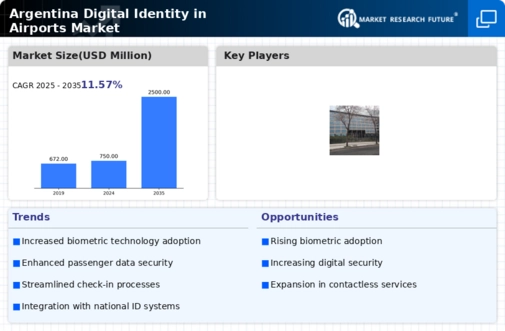Rising Passenger Traffic
Argentina has experienced a steady increase in air travel, with passenger numbers expected to rise by 10% annually over the next five years. This surge in air traffic is likely to put pressure on airport operations, necessitating the adoption of efficient identity verification systems. The digital identity-in-airports market stands to benefit from this trend, as airports seek to reduce wait times and enhance security measures. The integration of biometric technologies could streamline passenger flow, allowing for quicker boarding processes and improved overall satisfaction. Consequently, the demand for digital identity solutions is anticipated to grow, potentially reaching a market value of $200 million by 2028.
Collaboration with Technology Providers
The digital identity-in-airports market in Argentina is witnessing increased collaboration between airports and technology providers. These partnerships are essential for developing and implementing innovative identity verification solutions. By leveraging the expertise of technology firms, airports can enhance their digital infrastructure and improve operational efficiency. This trend is likely to lead to the introduction of cutting-edge biometric systems, which could transform the passenger experience. As a result, the market may see a compound annual growth rate (CAGR) of 18% over the next five years, driven by the demand for integrated solutions that streamline airport operations and enhance security.
Increased Focus on Passenger Experience
Airports in Argentina are increasingly prioritizing passenger experience, recognizing its impact on overall satisfaction and loyalty. The digital identity-in-airports market is likely to benefit from this focus, as seamless identity verification processes can significantly enhance the travel experience. By implementing advanced technologies, airports can reduce congestion and wait times, leading to a more pleasant journey for travelers. This emphasis on customer service may drive investments in digital identity solutions, with projections suggesting a market growth of 12% by 2026. As airports strive to differentiate themselves, the integration of user-friendly identity verification systems will become a key competitive advantage.
Government Initiatives for Digital Transformation
The Argentine government has been actively promoting digital transformation across various sectors, including transportation. This initiative is likely to enhance the digital identity-in-airports market by streamlining processes and improving efficiency. With investments in technology infrastructure, the government aims to modernize airport operations, which could lead to a projected growth of 15% in the digital identity sector by 2027. Such initiatives may also foster public-private partnerships, encouraging innovation and the adoption of advanced identity verification systems. As a result, the digital identity-in-airports market could see increased funding and support, facilitating the implementation of biometric solutions and enhancing passenger experience.
Technological Advancements in Biometric Solutions
The digital identity-in-airports market is poised for growth due to rapid advancements in biometric technologies. Innovations such as facial recognition, fingerprint scanning, and iris recognition are becoming increasingly sophisticated and cost-effective. In Argentina, the adoption of these technologies is likely to enhance security and efficiency at airports. As biometric systems become more reliable, airports may implement them on a larger scale, potentially increasing the market size by 20% over the next few years. This trend indicates a shift towards automated processes, which could significantly improve the passenger experience while ensuring robust security measures are in place.












Leave a Comment